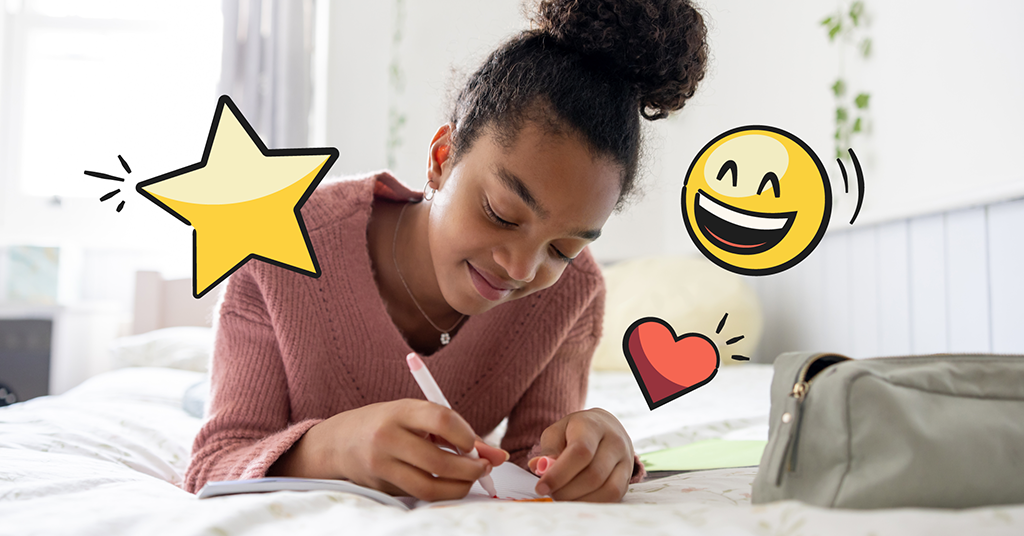
With the onset of social media, it’s become an increasingly difficult job to develop our kid’s self-confidence. As soon as they open Instagram, TikTok, Snapchat, or any other app, they’re seeing other people’s “perfect” appearance — and then the comparison game begins. Of course, these “perfect” appearances are often altered with editing apps, but this is easily overlooked by impressionable kids.
So our job as parents is to protect our children’s self-confidence, even when it seems social media does its best to tear it down! Below, we’ll discuss why self-confidence matters, how to build self-confidence in your children, how to talk to your kids about body image, and much more. Let’s jump in!
Why Self-Confidence Matters
Did you know that kids and young teens with high self-confidence are more likely to have success in school, relationships, and other areas of life? This is because they feel empowered to take risks and try new things. They’re also better able to handle failure since they know that setbacks don't define them — they can always try again!
Confidence builds up over time through positive reinforcement from parents, teachers, peers, and mentors who help children realize their unique strengths and talents. It’s also important for parents to encourage healthy habits, like eating healthy and exercising regularly, to foster a positive body image.
Tips for Parents to Improve a Child's Self-Confidence
1. Be a positive role model
If you want to learn how to build self-confidence in children, you should start with your own habits. To inspire the same in your kids, modeling positive physical and emotional behavior can go a long way. Set a good example by staying true to yourself and speaking kindly about yourself and others. It may not always seem like it, but kids are always taking cues from their parents to figure out what to do.
2. Focus on developing healthy communication skills
The best way to encourage healthy communication is to make sure your kid knows they can express their feelings to you without fear of judgment or criticism. This helps build trust between you and your child and builds problem-solving skills, which they can use in every part of life. Start conversations with meaningful questions such as “Would you like me to listen if something is bothering you?” instead of the normal “How was school today?”
Letting children know they have an outlet when things get tough reinforces the idea that speaking up isn't a weakness but rather a strength — allowing them space for honest expression builds connection on an emotional level which will serve them well into adulthood.
3. Be body positive
If your child struggles with confidence, it’s likely that they have a poor body image that contributes to this. Try to reinforce body-positive ideas, that no one actually has a “perfect” body like we see on social media, and the best body you can have is the one that is healthiest!
Another key aspect of being body-positive is to explain that beauty comes from within, not simply what we look like on the outside. For kids, this can be hard to genuinely believe, when the desire to be accepted by others is so strong. Even adults struggle with this sometimes. But parents can be intentional about focusing on inner qualities, such as a child’s creativity or intelligence, as opposed to just focusing on physical appearance.
4. Celebrate their successes
You can help foster a strong sense of confidence within your children by showing unconditional love and support regardless of how successful they are at any given task or activity. Remember, never criticize them — we all make mistakes, and that’s okay! By celebrating their successes, you validate their efforts and their abilities, allowing them to develop a greater willingness to try new things.
5. Encourage vulnerability
Encouraging your kids to be vulnerable by expressing their feelings honestly will help them learn how best to cope with difficult emotions. Unfortunately, when kids are taught to hide their emotional needs growing up, this can ultimately lead to substance use disorders and other issues in the future. Learning how to self-regulate will not only help them learn how to deal with their emotions healthily, but it will also nurture their self-confidence.
6. Teach them to engage in self-care activities
Self-care activities such as meditation, journaling, art therapy, or engaging in other hobbies can be incredibly beneficial for helping kids boost their own levels of happiness. When kids take part in activities that help them feel emotionally balanced, they’re able to handle setbacks much easier and reduce stress. This lays a strong developmental foundation and ultimately promotes greater self-confidence in young kids.
Bringing Kids into the Conversation
Parents need to bring their children into the conversation about self-confidence, especially when it relates to body image. It may feel uncomfortable at first, but talking openly about these issues is important to help kids develop a positive mindset. Parents can start by asking questions such as “How do you feel about your body?” or “What do you think when you see images of people online?” This will create space for open and healthy dialogue with kids. Remind them that not everything they see on Instagram or TikTok is real.
You can also encourage your children to make healthy choices that support their physical and mental well-being. Kids should be encouraged to participate in activities they enjoy, such as sports, music, art, or any other activity that allows them to express themselves freely. Helping children and young teens learn how to take care of their physical health through diet and exercise can go a long way toward developing confidence in themselves and their bodies.
When to Get Professional Help
If you’ve realized your child is struggling with self-confidence or body image issues, there comes a point when assistance is needed. If your child is struggling with depression or anxiety, extreme dieting, self-harm behaviors, or simply feeling overwhelmed by life in general, then seeking out a counselor or therapist can be beneficial. Professional help gives children the opportunity to talk through their feelings with someone who understands and has experience dealing with similar situations.
Fortunately, your help as a parent, coupled with professional guidance, can help get your child on the right track when it comes to building self-confidence and better self-esteem.
How Bark Can Help
If you need help monitoring what your kids are viewing online, the Bark app can help! Our app has helped countless parents recognize the warning signs of low self-confidence and depression in their children and helped them support their kids when it was most needed. So if you’re ready to start building your child’s self-esteem, try a free trial of the Bark app today.
Read more
Bark helps families manage and protect their children’s digital lives.





